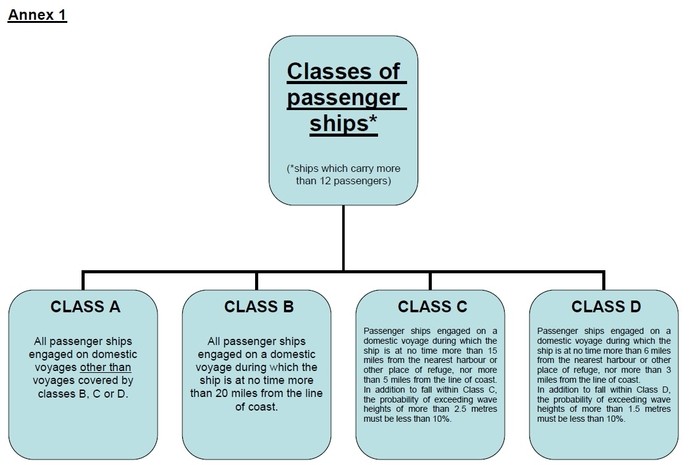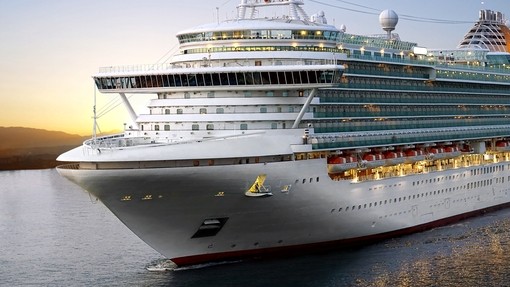Regulation (EC) no 392/2009 of the European parliament and the council 2009 on the liability of passengers by sea in the event of accidents

Details
Introduction
The European Parliament and Council formally adopted EU Regulation 392/2009 to implement the Athens Protocol 2002 (2002 Protocol) into the EU Member States. The Regulation (PLR) came into force on 23 April 2009 and required Member States to deposit new instruments of ratification simultaneously on 31 December 2012.
The terms of the 2002 Protocol applying to international carriage as amended by the PLR will apply directly in the 27 Member States from 31 December 2012 and will not require national implementation.
The purpose of the PLR is to:
- Create a single set of rules across the EU member states governing the liability of carriers to passengers travelling by sea in the event of an accident.
- Extend the PLR to include carriage by sea within a single member state on a step by step basis to different classes of vessel and apply the provisions of the 2002 Protocol to the Athens Convention relating to the Carriage of Passengers and their Luggage by Sea 1974 as amended by the PLR to international and national transport by sea within the community.
- Increase the Athens 1974 levels of compensation for passengers involved in maritime accidents. The PLR applies the liability regime as set out in the 2002 Protocol and the IMO Guidelines. As a result, the Regulation increases the Athens 1974 limits of 46,666 SDR’s per passenger per carriage to a maximum of 400,000 SDRs per passenger per carriage for death or personal
injury and introduces strict liability for Shipping Incidents. - Require compulsory insurance is in place with direct action against the Insurers for international carriage for Vessels registered in the EU.
- Require the Provision of appropriate information on rights being conferred on passengers prior to their journey or, where that is not possible, at the latest on departure.
- Address compensation for terrorism related-damage by making binding parts of the IMO Guidelines adopted by the Legal Committee on 19.10.2006 and allows States to limit the Carrier’s liability for war and terrorism to 250,000 SDR’s per passenger per incident or 340,000,000 SDRs overall per ship on each distinct occasion, i.e. £332,086,381.53
- Require advance payments to be made by Performing Carriers and by Carriers established within the EU without recognition of liability in respect of a Shipping Incident
- Provide for compensation for mobility equipment outside the limits and the meaning of Luggage and Vehicles under Article 8 of the Athens Convention 1974.
Classes of Passenger Ships
Passenger ships (defined as ships which carry more than 12 passengers) are divided into four classes A to Daccording to the sea areas and distance from the coast within which they operate. Please see Annex 1 for full details of the four classes. Account should be taken of the consequences for fares and the availability and costs of insurance when considering whether to extend to these classes of Vessels.
Application of the Regulation within a Single Member State
- Applies the provisions of the Athens Protocol 2002 and the IMO Reservation and Guidelines for the Implementation of the Athens Convention within a single Member State on board ships of Classes A and B. States may use the derogations to apply the PLR to these Vessels from 31 December 2016 and 31 December 2018 respectively. This is the UK’s preferred policy.
- States may extend to classes C and D. The European Commission may present a legislative proposal to extend the scope of the Regulation to Ships of Classes C and D no later than 30 June 2013.
Amendment to the Athens Protocol 2002 for the Purposes of the PLR
There are three Articles of the Athens Protocol 2002 which are not incorporated into the PLR. These are Articles 2(1), 17 and 17bis and deal with the following:
- Scope
The Athens Convention 1974 applies to international carriage by sea if the ship is flying the flag of or is registered in a state party to the Convention, or the Contract of Carriage has been made in a state party to the Convention, or the place of departure or destination according to the Contract of Carriage is in a state party to the Convention.
The PLR applies the 2002 Protocol as amended to contracts of carriage made in a Member State or to Ships registered in or Ships departing/arriving in Member State. The PLR gives Member States an option to cover domestic carriage by sea within a single Member State on board ships of a certain category.
- Jurisdiction and Enforcement
Article 17 and 17bis of the 2002 Protocol are not incorporated into the PLR because jurisdiction and enforcement are already covered by Council Regulation 44/2001 in civil and commercial matters - the “Brussels Regulation” - on Jurisdiction and the Recognition and Enforcement of Judgments. This is confirmed by Recital 11 of the PLR.
Compensation in Respect of Mobility Equipment or Other Specific Equipment
Liability for loss of or damage to mobility or other specific equipment is governed by Article 3(3) of the Athens Convention, which requires fault or neglect on the part of the Carrier or is presumed in the case of a Shipping Incident.
Compensation is for the replacement value of the equipment or the cost of repair. This is reproduced in Article 15 of the EU Regulation 1177/2010 relating to passenger rights when travelling by sea and inland waterways.
Global Limitation of Liability
- The PLR does not modify the rights or duties of the Carrier or Performing Carrier under national legislation implementing the International Convention on Limitation of Liability for Maritime Claims 1976 as amended by the 1996 Protocol.
- In the UK Limitation of passenger liabilities on non-seagoing ships is capped by LLMC 96 Article 7 - as modified by UK law (SI 1998/1258) to the effect that the global fixed cap is removed and replaced with an SDR 175,000 per passenger limit; and
- For seagoing ships, the intention appears to have been that limitation of passenger liabilities would not be subject to any LLMC 96 Article 7 cap and instead be governed solely by the Athens Convention as modified under UK law (applicable provisions in SI 1998/1258, SI 1998/2917 and SI 2004/1273) – wherein the Athens Convention limits are SDR 46,666 per person or SDR 300,000 per person for any carrier whose principal place of business is in the UK. The way it was done however, seems to have inadvertently let back in the possibility of applying the general global limitation limit of LLMC 96 Article 6 applying also to passenger claims. That clearly cannot have been intended but is there nevertheless.
- The right to limit under LLMC 96 Article 7 has already been removed from UK law and it is assumed that the Dft wish to make certain that limitation under Article 6 is also removed.
- In the UK, the Dft has proposed in its consultation that the 1996 Protocol does not apply to seagoing passenger vessels. Care needs to be taken to ensure that global limitation still exists for seagoing Vessels where a per capita limit does not apply ie, seagoing Vessels where passenger may not have a contract of carriage.
- Member States can limit their liability as per IMO Guidelines for War and Terrorism to 250.000 SDRs per passenger or 340,000,000 SDRs per incident.
Advance Payments
- Where the death of, or personal injury to, a passenger is caused by a Shipping Incident, the Performing Carrier (of the whole or part of the carriage) when the Shipping Incident occurred shall make an advance payment sufficient to cover immediate economic needs on a basis proportionate to the damage suffered within 15 days of the identification of the person entitled to damages. In the event of the death, the payment shall not be less than €21,000.
- This provision also applies where the Carrier is established within the community.
- An advance payment does not constitute recognition of liability and may be offset against any subsequent sums paid.
- The payment will not be refundable except where the Carrier can prove that the incident resulted from an act of war, hostilities, civil war, insurrection, or a natural phenomenon of an exceptional, inevitable and irresistible character or was wholly caused by an act or omission done with intent to cause the incident by a third party.
- The payment may also be refundable where there is contributory fault or it is a case under Appendix A of the IMO Guidelines (radioactive contamination, chemical, biological, biochemical and electromagnetic exclusion clause) or where the person who received the payment was not entitled to damages.
Information to Passengers
- Without prejudice to the obligations of tour operators as set out in the Package Travel Regulations (Council Directive 90/314/EEC of 13 June 1990) the Carrier and/or Performing Carrier shall ensure that passengers are provided with appropriate and comprehensible information regarding their rights under the PLR.
- Where the contract is made in a Member State that information shall be provided at all points of sale, including sale by telephone and by the internet.
- Where the place of departure is in a Member State the information shall be provided prior to departure.
- In all other cases it shall be provided at the latest on departure.
- A summary of the provisions of the PLR will be prepared by the Commission and made public. The Carrier and Performing Carrier shall be obliged to provide that information as a minimum to complying with the Regulation.
Athens Protocol 2002 Provisions
The PLR (with amendments) applies the text of the Athens Convention 1974 as amended by the Athens Protocol 2002.
Definitions
“Carrier” means a person by or on behalf of whom a Contract of Carriage has been concluded, whether the carriage is actually performed by that person or by a Performing Carrier. This will include time Charterers selling as principal and tour operators selling “Packages” to EU.
“Performing Carrier” means a person other than the Carrier, being the Owner, Charterer or Operator of a ship who actually performs the whole or a part of the carriage; and “Carrier who actually performs the whole or a part of the carriage” means the Performing Carrier or insofar as the Carrier actually performs the carriage, the Carrier.
“Contract of Carriage” means a contract made by or on behalf of a Carrier for the carriage by sea of a passenger or of a passenger and his luggage.
“Ship” means a seagoing vessel excluding an air cushion vehicle.
“Passenger” means any person carried in a Ship under a Contract of Carriage or who, with the consent of the Carrier, is accompanying a vehicle or live animals which are covered by a contract for the carriage of goods not governed by the Convention.
“Luggage” means any article or vehicle carried by the Carrier under a Contract of Carriage excluding articles and vehicle carried under a Charterparty, Bill of Lading or other contract primarily concerned with the carriage of goods and live animals.
“Cabin Luggage” means Luggage which the Passenger has in his or her cabin or otherwise in his possession, custody or control and includes Luggage which the Passenger has in or on his vehicle.
“Loss of or damage to Luggage” includes pecuniary loss resulting from the Luggage not having been redelivered to the Passenger.
“Carriage” covers the period when the Passenger and his Luggage are on board the Ship or in the course of embarkation or disembarkation and the period during which the Passenger and his Cabin Luggage are transported by water from land to the Ship or vice-versa if the cost of such transport is included in the fare or if the vessel used for this purpose has been put at the disposal of the Passenger by the Carrier. It does not include the period during which the Passenger is in a marine terminal or station or a quay or in any other port installation. With regard to Cabin Luggage, it also includes the period during which the Passenger is in a marine terminal or station or on a quay or any other port installation if that Luggage has been taken over by the Carrier or his servant or agent and has not been redelivered to the Passenger.
“Shipping Incident” means shipwreck, capsizing, collision or stranding of the ship, explosion or fire in the ship, or defect in the ship.
“Defect in a vessel” means any malfunction, failure or non-compliance with applicable safety regulations in respect of any part of the Ship or its equipment when used for the escape, evacuation, embarkation and disembarkation of Passengers, or when used for the propulsion, steering, safe navigation, mooring, anchoring, arriving or leaving berth or anchorage, or damage control after flooding, or when used for the launching of life saving appliances.
Liability Regime for Death/Personal Injury
- All claims for death or injury and or loss of or damage to luggage must be brought against a Carrier or Performing Carrier in accordance with the PLR and contractual provisions relieving the Carrier of liability or prescribing lower limits are invalid.
- Applies to commercial carriage by public authorities
- If death or personal injury to a passenger is caused by a Shipping Incident the Carrier shall be liable up to 250,000 SDRs on each distinct occasion unless the Carrier proves that the incident resulted from an act of war, hostilities, civil war, insurrection, or a natural phenomenon of an exceptional, inevitable and irresistible character or was wholly caused by an act or omission done with the intent to cause the incident by a third party.
- This is completely different to the previous provisions under Article 3(3) where fire, grounding, collision, etc. gave rise to a rebuttable presumption of liability against the Carrier. It also means that liability may attach for war and terrorism unless the Carrier can prove the incident can be brought within the exception. The failure to detect risk will be a certain feature for such claims.
- The Carrier will be liable up to a further 150,000 SDRs unless the Carrier proves that the incident which caused the loss occurred without the fault or neglect of the Carrier. There is therefore a rebuttable presumption of negligence in relation to the additional 150,000 SDRs in respect of a Shipping Incident.
- Where the death or injury to a passenger does not occur by a Shipping Incident, i.e. slip or trip on board the vessel, then the Carrier shall be liable if the incident which caused the loss was due to the fault or neglect of the Carrier. As with Article 3(1) of the 1974 Convention, the burden of proving fault or neglect in such cases lies with the Claimant. The liability of the Carrier for such claims will be limited to 400.000 SDRs subject to Article 13 and conduct barring limitation.
- The limit applies to all damages and even where the award is provisional or periodical.
- Limits can be increased by the Legal Committee by adopting the procedure in Article 23.
- Interest on damages and legal costs are not included in the limits of liability.
- States can regulate by national law a higher limit of liability. The UK is not recommending having a higher national limit.
- As with the 1974 Convention, fault or neglect includes the servants of the Carrier acting within the scope of their employment.
- Provisions re aggregation of claims remain as set out in the 1974 Convention.
- Loss does not include punitive or exemplary damages.
- As in the 1974 Convention, the principle of contributory negligence remains.
Liability for Property
- In relation to loss of or damage to cabin luggage, the Carrier shall be liable if the incident which caused the loss was due to the fault or neglect of the Carrier.
- However, where the loss has occurred due to a Shipping Incident, then the fault of the Carrier will be presumed.
- In relation to other luggage, the Carrier will be liable unless it can prove that the incident which caused the loss occurred without the fault or neglect of the Carrier.
- The notice provisions remain as per 1974 Convention and luggage is presumed to delivered undamaged if provisions not complied with.
Increase of Limits of Liability for Property
- As with the 1974 Convention, a Carrier is not liable for Valuables which includes loss of or damage to monies, negotiable securities, gold, silverware, jewellery, ornaments, works of art or other valuables except where these have been deposited with the Carrier for safe keeping. It is still important to distinguish between items deposited with the ship and where passengers use their safes for a charge in their cabins. The limits for Valuables which have been deposited with the ship have been increased to 3,375 SDRs per passenger per carriage (previously 1200 SDRs), though a higher limit can be agreed.
- The limits for loss of or damage to cabin luggage have increased from 833 SDRs to 2,250 SDRs.
- The limits for vehicles, including all luggage carried in or on the vehicle, have been increased from 3,333 SDRs to 12,700 SDRs per vehicle per carriage.
- All other luggage shall not exceed 3,375 SDRs.
- The parties can agree to higher limits.
Compulsory Insurance and Direct Action
- Performing Carriers must maintain compulsory insurance (or other financial insurance) of not less than 250,000 SDRs per passenger where passengers are carried on board a ship registered to a Member State.
- Passengers, have a right to bring a claim directly against the insurer/provider of the financial security up to the 250,000 SDR limit.
- A Member State shall not permit a ship under its flag to operate without a certificate.
- There is a required form of certificate of insurance or other coverage to be issued to the ship by the appropriate authority.
- A Member State is required to provide under its national law for insurance or other financial security is in force for ships entering or leaving a port in its territory regardless of the Ship’s country of registry.
Any claim for compensation covered by the insurance or other financial security may be brought directly against the insurer or other body providing financial security. In relation to P&I insurance, this goes against the “paid to be paid principle”, the International Group limits of US$ 2 billion for passengers and US$3 billion for passengers and crew, and cover for war and terrorism. The provisions for Direct actions provide:
- Insurers have the same defences as the Carrier/Performing Carrier.
- Insurers may invoke the defence which the Carrier could have invoked in accordance with the 2002 Protocol.
- The insurers may invoke the defence that the damage resulted from the wilful misconduct of the assured, but no other defence which the insurer may have been able to raise in respect of the Carrier.
- Insurers have the right to require the Carrier and Performing Carrier to be joined to the proceedings.
The P & I Clubs have agreed to provide Blue Cards for non War and Terrorism liabilities. The issue of Blue Cards for War and Terrorism is still under discussion and negotiation and is likely to be a product available from the Market.
Loss of Right to Limit
- The provisions in Article 13 with regard to the Carrier’s loss of right to limit remain as per the 1974 Convention and therefore the Claimant must prove that the damage resulted from an act or omission of the Carrier, done with the intent to cause such damage or recklessly and with knowledge that such damage would probably result.
- The acts of employees will not displace the right of the Carrier to limit liability.
- Where individuals are sued they can lose their right to limit based on their own breach of Article 13.
Time Bars
- The time bar for loss of or damage to luggage remains two years from the date of disembarkation or when the luggage should have disembarked.
- In the case of personal injury, the limitation period continues to run from the date of disembarkation of the passenger and in the case of death occurring during carriage, the two years runs from the date when the passenger should have disembarked. Where a passenger dies after disembarkation, then the two-year period runs from the date of death as long as the total period does not exceed three years from the date of disembarkation.
- As with the 1974 Convention, the law of the country in which the case is heard will govern the grounds for suspension and interruption of limitation periods. In the UK this is an absolute time bar as the Limitation Act 1980 does not deal with time limits under the Athens Convention. (Stena –v- Highman). Similarly, in the UK claims for minors and persons under disability is 2 years as above.
- Article 16 introduces a maximum period of five years, beginning with the date of disembarkation, in relation to the maximum periods in which claims can be brought where the Court has the power to suspend or interrupt limitation periods, or, if earlier, three years beginning with the date of knowledge. In order for these provisions to apply in the UK there will have to be amendments to National law.
Summary and Action
- The 2002 Protocol will not become an International Convention until a total of 10 countries ratify the Convention. The PLR will apply its Provisions in the EU from 1.1.2013.
- Booking Conditions and Carriers Conditions of Carriage will need to be amended to reflect the provisions of the PLR. Care to be taken to ensure that the right provisions are incorporated into EU, US and other countries.
- Where the Contract of Carriage is made in the EU or Vessel is registered in the EU, the PLR liability and limitation provisions will apply to cruises taken outside EU waters and on non EU flag Vessles though the compulsory insurance provisions will not.
- There will be a number of regimes in place at the same time.
- PLR for seagoing international carriage where there is a Contract of Carriage
- PLR in some states for classes A & B Domestic Voyages
- Athens 1974 for domestic sea carriage for present signatories which may result in different national limits (in the UK it is proposed that the 300,000 SDR’s will still apply to domestic carriage and Performing Carriers with a principal place of business in the UK otherwise the limit is 46,666 SDRs)
- Domestic law for non-Athens 1974 States or where there is no Contract of Carriage.
- Tour operators who are not Performing Carriers must ensure that they apply the correct provisions.
- Compulsory insurance needs to be put in place to deal insurance requirements of the PLR and in particular war and terrorism.
- Passengers must be notified of the rights and limits at the time of booking or at the latest at the time of departure. Failure to notify will result in penalties being imposed at national level.
- Contingency Planning for a major incident must take into account the provisions regarding liability under the PLR and advance payments.
Offences and Penalties
Will apply for failure to insure, failing to produce a certificate, cancellation of certificate and failures to give notice. Most offences will apply to the Master as well as the Carrier/ operator. Fines and ship detentions may result.





